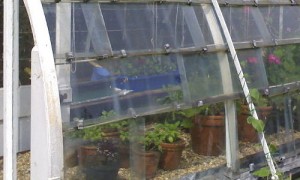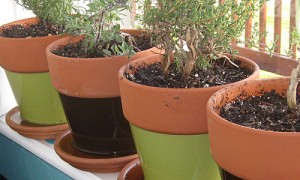Guest post by LawnStarter
Creating a fragrance garden is a great way to attract hummingbirds to your home as well as provide a nice scent for guests who visit your outdoor living space. An ambrosial fragrance garden can consist of many different kinds of plants in the ambrosia plant family which is also known as Asteraceae. As an ambrosial fragrance garden may not be a super popular landscape trend in certain metros, it is a delicate gardening technique that can really vibe up the atmosphere surrounding your home, and not to mention make your backyard a unique beauty in the neighborhood. Here are some tips on creating an ambrosial fragrance garden to your outdoor living space this summer.
Plant Near Walkways
A fragrant plant that is located in the back corner of your garden will still look beautiful but the chances of you enjoying its scent are low. Make sure to plant fragrant flowers near areas of your outdoor living space that you pass by on a daily basis. Beautiful gerbera daisies would be a good option to include in a border or near a walkway. Other spots would include planting daisies in a pot near the front door or possibly an enclosed area where the scent can stick around for a while.
Plant Location Specific
A main part of creating a fragrance garden is to know how large each plant will grow. For those shorter ambrosia plants, like Marigolds, consider elevating their spot in the yard by hanging them in a basket or placing them in an elevated planter. This will allow you to get the full effect of the plant fragrance instead of leaving them near the ground where they would be hard to smell. Larger ambrosia species, like the sunflower, can be planted near the back of a gardenscape as their towering height will allow them to be fragrant to those passing by despite their far off location.
Don’t Use Chemicals
Flowers produce a fragrance based on their essential oils that evaporate into the air. Using chemical additives to your garden could mask the good scent of the flowers. Added chemicals could also hurt butterflies, hummingbirds, and bees that will be attracted to the plants. Make sure to protect your fragrance garden by using homemade options for insect control or biopesticides that are made from natural occurring elements.
Balance Out the Garden
The purpose of planting a fragrance garden is to enjoy the individual scent of each plant. Make sure to balance out where you plant aromatic varieties by placing like varieties in groups together. Spread out those plants that will give off a strong scent, like goldenrod, and plant unscented options in between the groups of fragrant ones. Doing so will help to create a balanced fragrance garden that will be pleasing and not overwhelming.
Use Different Colors
Choosing a variety of colored ambrosia plants is a great way to mix up the overall look of your fragrance garden as well as provide multiple scents. Those plants with white or pastel colored flowers will oftentimes produce more scent than those colors that are brighter like red or orange. There are so many plants in the ambrosia plant family with many different options to choose from. If you were a big fan of chrysanthemums, which is a popular ambrosia plant, you could choose many different colored varieties just in that one plant family to provide unending fragrance to your outdoor living space.
There are so many plants in the ambrosia plant family that would provide a beautiful fragrance garden. Consider adding marigolds that are placed at a higher level in the garden to easily smell their fragrance. Balancing out the garden and planting super fragrant varieties, like goldenrod, in groups by themselves will help to not overpower the garden. Placing plants near heavily used areas of the garden, staying away from chemicals, as well as using a variety of different colors will only enhance the overall look and scent of your ambrosia fragrance garden.






